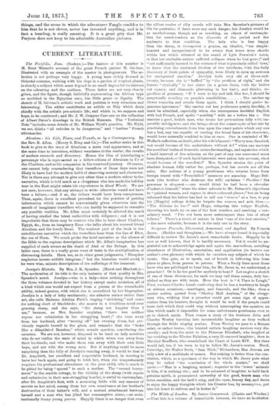Abraham : his Life, Times, and Travels, as by a
Contemporary. By the Rev. R. Allen. (Henry S. King and Co.)—The author seeks in this book to give to the story of Abraham a more real appearance, and at the same time to introduce, without weariness to the reader, the results of modern research and discovery. Hence the idea of introducing a personage who is represented as a fellow-citizen of Abraham in Ur of the Chaldees, and as his companion in his westward journe3r. Of course, one cannot help remembering that travellers of those days were not likely to have had the modern habit of observing scenery and character. Nor is there any attempt to give any other than a modern oolour to the narrative, which is told mush as a clergyman who has made his holiday tour in the East might relate his experiences in Good Words. We are not sure, however, that any attempt to write otherwise would not have been a failure,--and if so, the failure would have been conspicuous. Then, again, there is excellent precedent for the practice of putting information which cannot be conveniently given otherwise into the mouth of imaginary travellers who can hardly be supposed to resemble any possible realities. Mr. Allen must certainly be allowed the merit of having studied the latest authorities with diligence ; and it is not improbable that there may he readers who like to hear about Chalthea, Egypt, dm., from an imaginary Enos who talks about his revered friend Abraham and the lovely Sarai. The weakest part of the book is the antediluvian narrative which the travellers hear from the lips of Eber, the son of Shorn. We much prefer the brief narrative or the silence of the Bible to the copious descriptions which Mr. Allen's imagination has supplied of such scenes as the death of Abel or the Deluge. In this latter case, there is a really gross want of taste in the multiplication of distressing details. Here, too, as in other great judgments, " Diespiter neglectue incest° addidit integrum ;" but the historian would avoid, if he were wise, minute descriptions of the sufferings of the innocent.


































 Previous page
Previous page